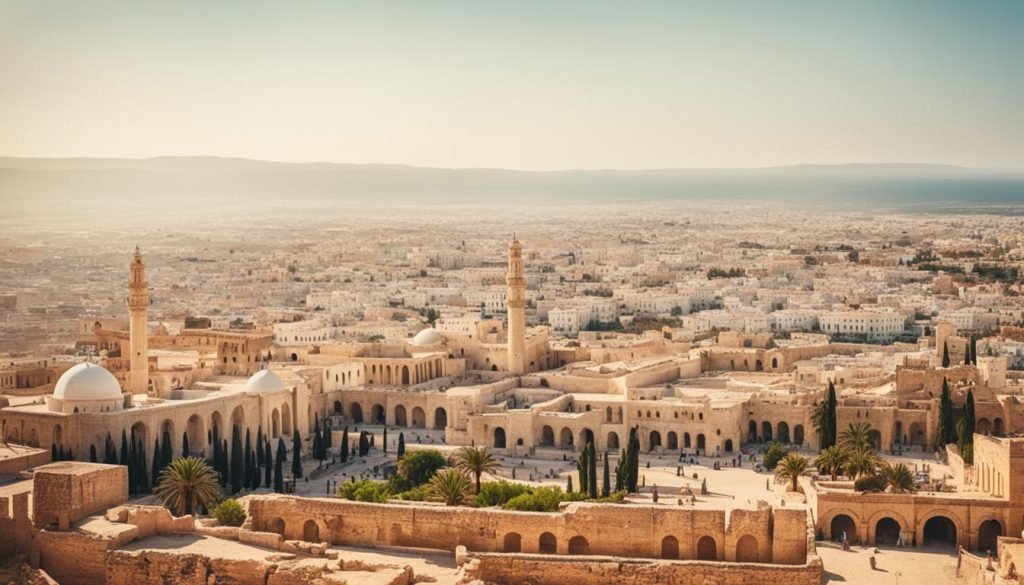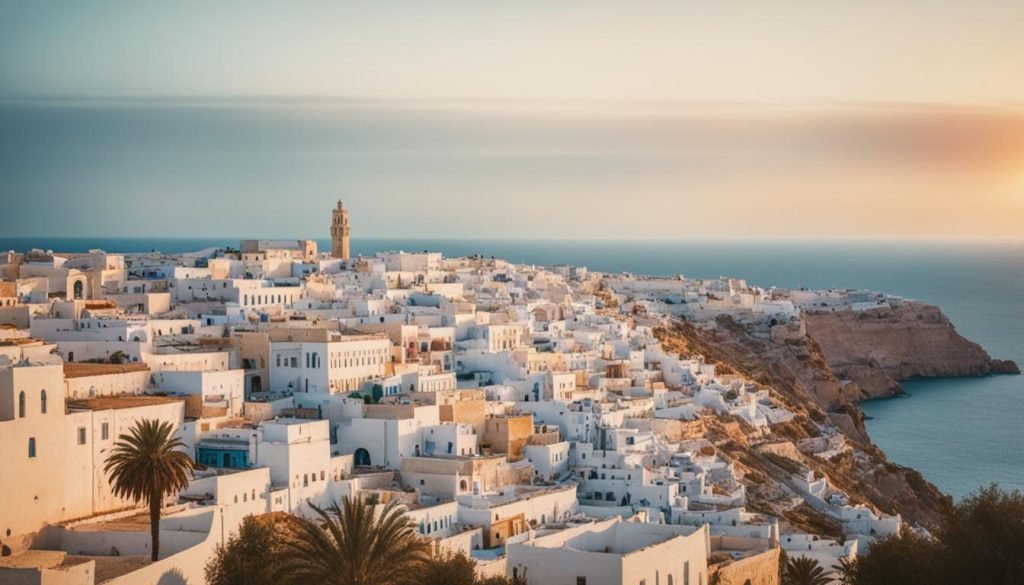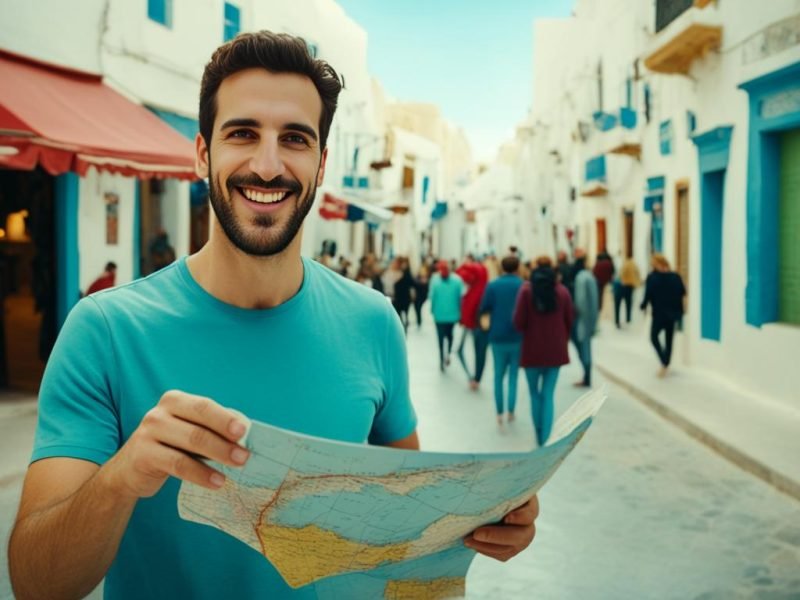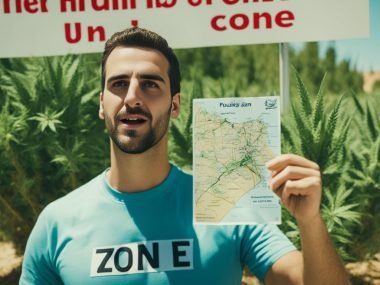Tunisia is a unique spot on my travel map. The sights of terracotta against the blue Mediterranean stay with me. Recalling the busy souks and peaceful olive groves helps me cherish my visits. When traveling to Tunisia, knowing about outdoor activities and tourist rules is vital.
This land tells ancient stories, from Carthaginian ruins to the Arab Spring’s legacy. But we often ask, “Can You Go Out In Tunisia?” It’s key to understand this to fully enjoy what Tunisia offers today. With recent changes, both political and social, travelers must be careful and respectful.
From hiking in the Atlas Mountains to relaxing on white sandy beaches, Tunisia has a lot to offer. It’s vital to listen to advice, much like understanding its beautiful mosaics. Traveling is about making connections. Knowing the local guidelines helps protect the culture, the people, and tourists.
Key Takeaways
- Check the latest FCDO travel advisories before planning outings in Tunisia.
- Be cautious of areas advised against travel such as the Chaambi Mountains National Park.
- Stay informed on the availability and safety of outdoor activities amidst the evolving political landscape.
- Recognise the heightened security measures in cities and regions experiencing civil unrest.
- Exercise vigilance in light of emerging political changes post-recent parliamentary elections.
- Remain updated on local guidelines and restrictions to enhance the safety and enjoyment of your travels.
Understanding Tunisia’s Current Travel Advisories
When travelling, safety is my top priority. It’s vital to know about Tunisia travel restrictions now. The FCDO’s recent advice helps us avoid risky areas.
FCDO’s Stance on Travel to Certain Regions
The Foreign, Commonwealth & Development Office (FCDO) warns against going to some Tunisian regions. They say these areas are risky because of military actions and terrorism. They aim to keep travellers safe, which is also my main goal.
Areas to Avoid for Security Reasons
You shouldn’t visit places like the Chaambi Mountains National Park. It’s near Algeria, making it unpredictable and possibly dangerous due to terrorism. Avoid areas within 75km of the Libyan border and governorates like Kasserine and Jendouba too. They have high security risks.
Impact of Civil Unrest on Travel
Civil unrest affects travel in cities like Tunis and Sfax. Such unrest can change travel situations quickly. It highlights the need to stay updated on Tunisia safety and security to avoid travel risks.
| Region | Advisory Level | Reason | Recommended Action |
|---|---|---|---|
| Chaambi Mountains National Park | All travel | Military operations | Avoid travel |
| Within 75km of Libyan border | All travel to certain areas | Terrorism risk, Civil unrest | Exercise caution, Follow local advisories |
| Kasserine and Jendouba governorates | All travel to certain areas | Military operations, Terrorism risk | Stay informed, Avoid non-essential travel |
| Tunis and Sfax | Varying levels | Civil Unrest | Remain vigilant, Prepare for disruptions |
Navigating Tunisia’s Safety and Security Landscape
Planning a trip to Tunisia requires knowledge of safety concerns. As a traveller, I aim to enjoy Tunisia’s beauty and culture safely. This means being aware of Tunisia safety considerations and the risk of terrorism in Tunisia. The country has boosted its security to protect everyone. But, it’s important to stay alert and know the local safety measures.
Prevalence of Terrorism and Protective Measures
Terror threats still exist, unfortunately. Incidents in places like Tunis and Djerba pushed Tunisia to upgrade security. The government has increased police presence. This move ensures locals and travellers are safer.
Responding to Emergency Situations
It’s vital to be ready for emergencies in today’s security climate. As a traveller, I’ve learnt about Tunisia’s emergency services. Knowing how to quickly get police and medical help is crucial. It’s a key travel tip to remember should you face unexpected issues.
Consular Support Accessibility in Tunisia
The consular support you get can change depending on where you are in Tunisia. Knowing the local security situation and available help is critical. I make sure I have the right contact details for where I am. This helps me manage any risks better.
| Emergency Service | Contact Number | Availability |
|---|---|---|
| Police | 197 | 24/7 |
| National Guard | 193 | 24/7 |
| Ambulance | 190 | 24/7 |
| Civil Protection | 198 | 24/7 |
In conclusion, Tunisia’s beauty and history are compelling. Yet, knowing about security and emergency services in Tunisia is key to travel planning. By learning and preparing, I go for a safety-first approach. This makes my journey through Tunisia safer and more enjoyable.
Guidance on Tunisia Nightlife Regulations
Planning to go out in Tunisia requires knowing the local nightlife rules. These rules protect everyone. The country’s night scene is lively, especially in tourist places. It’s important to respect local customs while enjoying it.
In some areas, the nightlife is more conservative because of Islamic traditions. As a traveller, I make sure to enjoy music, dining, and beach nightcaps respectfully. This means acting discreetly.
Recently, changes in security and rules have affected Tunisia’s nightlife. It’s essential to stay updated on these changes. The chart below shows what to consider when going out. This helps ensure a fun and respectful night.
| Venue Type | Consideration | Advisory Note |
|---|---|---|
| Traditional Cafés | Cultural Norms | Respect local customs, attire modestly |
| Nightclubs | Timings | Check for adjusted hours due to regulations |
| Restaurants | Alcohol Service | Some may have restrictions on alcohol sales |
| Beach Bars | Regional Variances | More relaxed in tourist areas, caution elsewhere |
| Music Events | Security Measures | Heightened checks at larger gatherings |
Tunisia nightlife is truly magical. I recommend experiencing it. Remember to follow local guidelines to ensure a fantastic evening. Discovering Tunisia at night is not just fun. It’s a way to learn about the nation’s rich culture and traditions.
Tunisia’s Entry Requirements Amidst Global Concerns
As global travel picks up, knowing the Tunisia entry requirements is key for a smooth trip. Before enjoying Tunisia’s stunning scenery and rich culture, understanding the Tunisia visa policies is essential. This ensures easy entry.
Visa and Passport Essentials
British tourists will be glad to know they need no visa for up to 90 days. Yet, having a valid passport is a must. With the world’s ever-changing situation, it’s crucial to keep travel documents, especially your passport, updated. This is a vital part of Tunisia travel documentation.
Contact and Travel Information Protocols
When you arrive, be ready to share your contact info, travel plans, and where you’re staying. These steps are not just formalities. They help protect both you and Tunisia.
| Documentation Type | Required Information | Purpose |
|---|---|---|
| Passport | Valid for the entirety of the stay | Identification & Proof of Eligibility to Travel |
| Contact Details | Address in Tunisia, Email, Phone Number | Safety & Security Measures |
| Travel Itinerary | Flight Details, Travel Dates | Monitoring & Managing Visitor Flow |
| Accommodation Evidence | Hotel Booking or Residential Address | Verification of Stay & Compliance |
Recent world events might affect travellers from south Asian backgrounds more. This reminds us of the complex nature of international travel. It highlights how crucial it is to follow the Tunisia entry requirements.
Health Precautions and COVID-19 Rules in Tunisia
Exploring Tunisia’s rich culture and historic sites, I see how vital health precautions are. The country has taken strict measures to combat the pandemic. Health services are easily accessible for everyone, locals and tourists alike. Following COVID-19 rules here protects not just me but the whole community.
Healthcare Services Accessibility
Travelling through Tunisia, it’s clear the country has worked hard to offer healthcare to those who need it. Everywhere from Tunis to Tozeur, clinics and hospitals are ready. This gives me peace of mind as I enjoy Tunisia’s sunshine and culture.
Compliance with COVID-19 Preventions
In every part of Tunisia, I see people taking COVID-19 precautions seriously. Health safety is a top priority here. In public places, everyone practices social distancing. Masks are also worn in indoor spaces. Both locals and visitors unite to maintain a safe environment.
| Preventative Measure | Description | Locations Where Measure is Imposed |
|---|---|---|
| Mask Requirement | Mandatory use of face coverings in enclosed public spaces and where social distancing isn’t possible. | Public transportation, shops, healthcare facilities |
| Social Distancing | Maintaining a safe distance of at least one meter from others to prevent virus transmission. | Markets, cultural sites, queues |
| Hand Hygiene | Frequent use of hand sanitizer and regular hand washing recommended. | Restaurants, hotels, public restrooms |
| Health Screening | Temperature checks and health questionnaires for symptoms monitoring. | Airports, accommodation facilities, large events |
Respecting Tunisia’s COVID-19 rules has made my trip more responsible. It shows how Tunisia’s people unite for safety. Their collective effort is creating a safer space for everyone visiting this captivating country.
Exploring Tunisia Outdoor Activities and Attractions
When I think back on my travels through Tunisia, so many experiences come to mind. Its coast runs for more than a thousand miles. Here, one can relax on the sunny beaches or try exciting water sports. This shows how varied Tunisia outdoor activities truly are.

But Tunisia offers more than just beautiful beaches. Its inland areas are rich in diverse landscapes and stories of the past. Visiting ancient Carthage, the medina of Tunis, and El Jem’s amphitheatre is like stepping into history. These places add to the wonder of Tunisia tourist attractions.
- Hiking through breathtaking sceneries in the Atlas Mountains.
- Wandering amidst the olive groves and orchards in Sfax.
- Hot air ballooning over the Sahara for an unforgettable dawn.
It’s important to always keep safety in mind. Especially when visiting places like El Feidja National Park. Make sure to check the latest travel advice before going on adventures in border areas. This way, your trip will be both fun and safe.
Responsible travel enhances experiences, where the beauty of discovery goes hand in hand with the safety of the encounter.
| Activity | Location | Notes |
|---|---|---|
| Snorkelling and Scuba Diving | Tabarka | Famous for clear waters and vibrant marine life. |
| Archaeological Tour | Dougga | Roman ruins with well-preserved theatre and temples. |
| Camel Trekking | Douz | Gateway to the Sahara and home to the International Festival of the Sahara. |
I urge everyone to fully experience the beauty of Tunisia. From its sun-kissed beaches and rolling desert dunes to the silent, ancient ruins. Tunisia is a place of immense beauty and diversity that touches the soul of all who visit.
Appreciating Local Laws and Customs in Tunisia
Visiting Tunisia means I pay attention to Tunisia local laws and customs. This isn’t just about respect; it’s key to keeping peace with the locals. The country’s deep Islamic traditions in Tunisia set rules for tourists. This is especially true about dressing modestly.
Islamic Traditions and Dress Codes
The Tunisia dress code is very important. In holy places, what you wear matters a lot. Clothes should show you understand and honor Tunisia’s Islamic roots.
Legality and Sensitivity Regarding Drug Use
Tunisia’s drug laws are very strict. For travelers who learn about these rules, the severe punishments are a clear warning. Steer clear of drugs to show respect and avoid trouble. The laws are tough and always applied.
The Implications of Exporting Antiquities
Another lesson from my visits is the importance of protecting Tunisia’s history. This means not taking old, important items out of the country. Following this law shows I respect Tunisia’s past.
| Aspect | Details |
|---|---|
| Dress Code | Modesty in attire, particularly at religious sites and conservative areas |
| Drug Laws | Stringent penalties and zero tolerance for drug-related offences |
| Antiquities Export | Strict restrictions and permissions required to export historical artefacts |
My Tunisia trips teach me a lot about respecting different cultures. Following Tunisia local laws and customs, understanding Islamic traditions in Tunisia, and sticking to the Tunisia dress code are essential. They make my visit more rewarding.
Tunisia Entertainment Options Beyond the Sunset
As the sun sets, Tunisia’s lively spirit shines through its night-time fun. It’s an experience where Mediterranean vibrancy meets North African tradition. This creates an enchanting evening atmosphere.
Diversity of Culinary Experiences
The cuisine here is amazing, pleasing all tastes. Dishes range from spicy harissa to tender lamb, called méchoui. Each meal tells a story, showing Tunisia’s diverse culture.
Restaurants and cafes are filled with delicious scents, like cumin and olive oil. They welcome everyone to enjoy meals together. Breaking bread under the stars brings people closer, sparking new friendships.
Cultural Events and Festivities
Tunisia’s cultural events are a feast for the senses. I love the music at Dar Sebastien and the films at the Carthage Festival. These events connect us to Tunisia’s rich history.
Seeing a concert at the El Jem amphitheatre or celebrating at a wedding is unforgettable. These traditions show Tunisia’s creativity and spirit. They touch our hearts and senses deeply.
Tunisia’s evening activities make me feel part of something bigger. Its culture, food, and music invite us all to join in. It’s a place where everyone can find joy and connection.
Conclusion
Tunisia offers a range of experiences as varied as its landscapes. Travellers must consider both its political and cultural diversity. It’s important to blend excitement with caution in this beautiful land. Stay aware of advisories for a safe journey.
Tunisia’s options for outdoor fun and vibrant nightlife highlight its lively spirit. Yet, respecting safety, laws, and health is key. By honouring local traditions, visitors can enjoy a true Tunisian experience while keeping safe and following rules.
“Exploring Tunisia is to discover a world brimming with ancient history, mesmerising landscapes, and welcoming locals, all demanding attentive respect for their ways of life and the rules of their land.”
Joining the journey in Tunisia means staying updated. It’s not just about planning your trip. It’s about making the experience richer and safer.

| Consideration | Importance |
|---|---|
| Safety and Security | Essential for a trouble-free journey |
| Respect for Local Customs | Vital for immersive and respectful interaction |
| Adherence to Travel Advisories | Crucial for informed decision-making |
| Health Precautions | Imperative for personal well-being |
To sum up, travelling to Tunisia requires readiness and responsibility. It’s a place where being prepared opens up unforgettable adventures. Remember, fully engaging with this North African gem means also focusing on safety and enjoyment.
Travel advice help and support
As an avid traveller, I’ve learned that strong support and current information can make a big difference. If you’re heading to Tunisia, keeping up with the latest news is crucial. I recommend signing up for email alerts to get the latest Tunisia travel advice. This way, you’ll get updates straight to your inbox and stay up-to-date with this North African country’s travel scene.
It’s also wise to keep in touch with your travel provider for bespoke assistance. If you need official info, your nearest British embassy or consulate is a reliable source. They offer advice for British citizens and can tell you about local laws and customs. Remember, help is always available, and you’re not alone in this.
In emergencies, it’s vital to know the local emergency numbers. Being familiar with these and where health facilities are is important, especially in remote areas. Support for travellers in Tunisia aims to ensure a safe visit. With these steps, you can enjoy your travels more, knowing you have a solid safety net.







